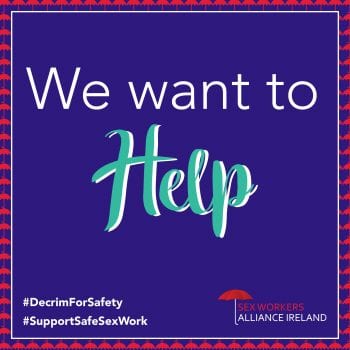Ireland has moved from Tier 2 to Tier 2 Watch List in the US State Department Trafficking in Persons report, released yesterday. This shows that our sex work laws are failing to help sex trafficking victims. Gardaí are ignoring and creating antagonism with their best resource to identify victims of sex trafficking, which are sex workers themselves.
Kate Mc Grew, director of the Sex Workers Alliance Ireland (SWAI) and current sex worker said “Globally, sex work prohibitionists have been successful in conflating all sex work as trafficking. This, combined with the fact that other forms of labour draw more trafficking victims into Ireland, has meant that resources are being misspent on a strategy of criminalising the purchase of sex that has not been proven to stop trafficking. This conflation has also meant that consenting sex workers working together for safety have been caught up in so-called brothel raids. In fact, the only people who have been arrested for brothel-keeping in Ireland have been young, migrant women. The Sexual Offences law 2017 is being applied in a racist way, which has been noted by IHREC.”
She continued “This report highlights how Ireland struggles to identify victims of trafficking. No one has been arrested for trafficking in Ireland since 2013. In 2017 our sex work laws changed and still, this has not changed. In fact, our laws have caused a 92% increase in crime against sex workers. What use are these laws, if not to protect people?
The crime of sex trafficking is despicable and we in SWAI condemn it in the strongest way. It’s unhelpful to separate out sex trafficking from other forms of labour trafficking. Central to anti-trafficking strategies in other sectors are workers ability to organise, unionise and report. Exploitative working conditions such as those experienced by people who have been labour trafficked have led to the loss of limbs and the report notes that ‘The government has reported the problem of forced labor in the country is growing’.
The best tool the state and Gardaí have to find trafficked victims is not utilised; sex workers. Our sex purchase laws have driven sex work underground, moving the small but very real number of sex trafficked victims away from agencies which can help them. Data shows that sex workers are extremely unlikely to report to the Gardaí after being victims of a crime, despite violent crimes increasing against us by 92%. Other avenues of reporting and identification should be available to trafficking victims as recommended by this report. A firewall is needed between immigration and sex crimes so that undocumented people feel safe to report crimes against them without fear of deportation.
Prevention of trafficking is key to reducing its prevalence. Oppressive border controls and lack of legal migration avenues, as well as poverty and addiction increase trafficking. We must reallocate some of the resources spent campaigning against sex work and “awareness-raising” of trafficking into prevention and poverty alleviation.
Now is not the time to increase oppressive laws in the hopes that this will deter traffickers. In fact, the pandemic is an opportunity to step back and reassess our laws and their failures. Pouring money into anti-sex work campaigns has not been successful, let us reimagine our anti-trafficking endeavours to include sex workers who are on the ground and are best placed to identify exploitation in the industry.
Decriminalisation of sex work is key and is a stance supported by PICUM Members (Platform for International Cooperation on Undocumented Migrants, International Labour Organization and The Global Alliance Against Traffic in Women (GAATW). It does not decriminalise the crime of trafficking or coercion, but it moves sex work out of its quasi-legal state and empowers sex workers with labour rights and pathways to justice. Sex workers want to be allies, and we are best placed to do so. But the law does not respond to the circumstances of deep poverty, domestic violence, homelessness, and drug mis-use that lead some to becoming susceptible to trafficking.”

